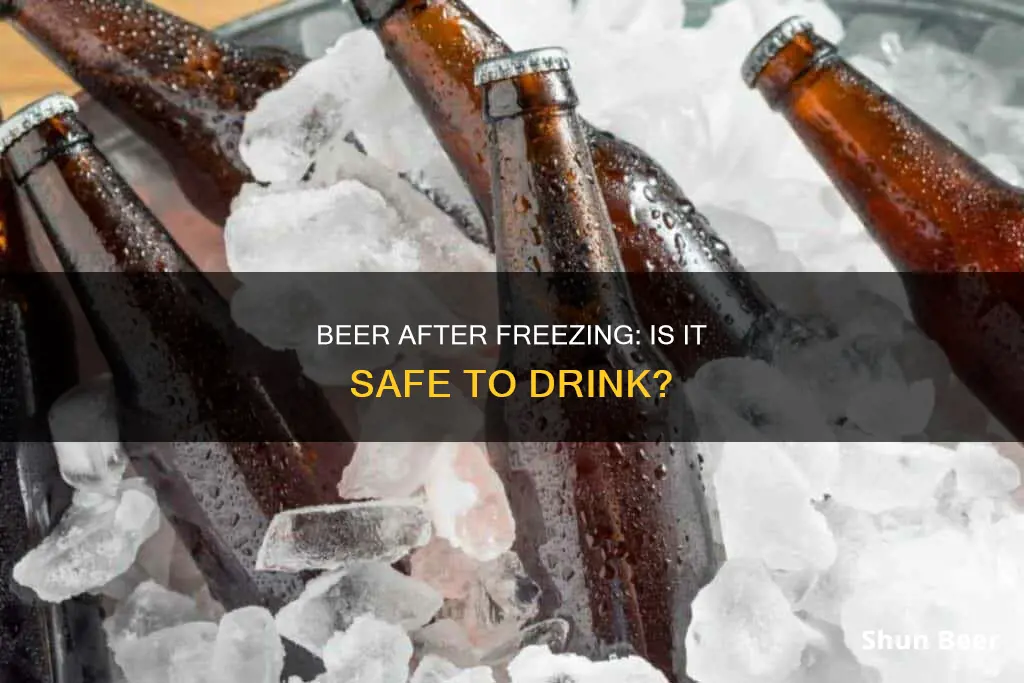
Freezing beer is a common accident, and it can be frustrating when it happens. But can you drink a beer that has been frozen? The answer is a little complicated. In short, yes, you can drink a beer that has been frozen, but it might not taste great.
What You'll Learn

Is it safe to drink a previously frozen beer?
It is safe to drink a previously frozen beer, but there are a few things to keep in mind. Firstly, check that the seal of the beer can or bottle is still intact. If the beer became unsealed while frozen, it will not taste the same because carbon dioxide will have escaped. This will affect the carbonation, causing the beer to go flat and impacting its flavour and consistency.
If the seal is still intact, the beer will be safe to drink once it has been properly thawed. Place the beer in the fridge or another cool area and allow it to thaw completely. This can take between 12 and 24 hours. Do not be tempted to drink the beer before it has completely thawed, as you will be consuming straight alcohol, which could be dangerous.
Even if the seal is intact and the beer is properly thawed, the flavour may still be affected. Freezing and thawing can cause the beer to oxidise, resulting in a stronger scent and a stale taste. It can also cause chill haze, which is an opaque sheen or floating bits and chunks in the beer. This is caused by proteins coming out of solution and binding to each other, and while it won't affect the taste or smell, it may be unappetising.
To avoid these issues altogether, it is best to store beer in a controlled environment, such as a refrigerator, at a temperature of 35-40 degrees Fahrenheit (1.7-4.5 °C). This will prevent the beer from freezing and ensure that it stays fresh and flavourful.
Beer Drinking: Why Do People Enjoy This Beverage?
You may want to see also

How does freezing affect the taste of beer?
Freezing can negatively impact the taste of beer in several ways. Firstly, freezing affects the carbonation of the beer. Carbonation is the bubbly feeling when drinking beer and is responsible for the foamy topping when poured into a glass. When beer freezes, carbon dioxide gas is released as its solubility decreases at lower temperatures. This results in flatter-tasting beer with reduced carbonation levels.
Secondly, freezing can alter the flavour profile of beer. The separation of alcohol and water during freezing, due to their different freezing points, leads to a stronger flavour and higher alcohol content if consumed before the beer is fully thawed. Even after complete thawing, the liquids may remain separated, distorting the original taste. Additionally, freezing and thawing can cause oxidation, enhancing the scent and producing a stale taste. In extreme cases, it could lead to denaturation, rendering the beer unsafe for consumption.
Freezing can also cause physical changes in the beer, such as the formation of a chill haze, which is a cloudy appearance after thawing. It can also affect the consistency of the beer, making it slushy and impacting its texture. Furthermore, the freeze-thaw cycle can distort the shape, colour, and texture of cans and bottles, and produce debris like coagulated proteins and hop resins.
Lastly, freezing can be detrimental to the yeast cells in the beer, reducing its quality. Yeast plays a crucial role in the fermentation process and contributes to the flavour and aroma of the beer. However, freezing temperatures can weaken or kill these yeast cells, resulting in a decrease in the overall quality of the beverage.
Managing High Blood Sugar: Beer's Impact and Your Health
You may want to see also

How does freezing impact carbonation?
Freezing can have a significant impact on the carbonation of beer. When beer freezes, the liquid expands, increasing the volume and pressure within the container. This expansion can sometimes cause the seal on the bottle or can to rupture, leading to a loss of carbonation.
If the beer remains sealed during freezing, it will generally retain its carbonation. According to Matt Meadows, the draft beer quality ambassador for the Brewers Association, "If the vessel stays 100-percent sealed and if the beer is allowed to return to a standard temperature, then Henry's Law dictates that carbonation will go back into solution in the same place it was before." In other words, as long as the beer thaws completely, it should have the same level of carbonation as it did before freezing.
However, if the seal is broken during freezing, the carbonation will be lost. Meadows explains, "If your vessel has stayed sealed, your carbonation will be fine. If not, it'll certainly be flat." When beer freezes, the carbon dioxide (CO2) is the first thing to escape, resulting in a flat beverage once the beer thaws.
It is worth noting that even if the beer remains sealed and carbonated, freezing can still affect its overall quality. Freezing can cause proteins in the beer to come out of solution and bind together, creating a "chill haze." This haze can range from a slight opacity to visible floating chunks, which may be unappetizing to drinkers, even though it does not affect the taste or smell of the beer.
Therefore, while freezing may not directly impact carbonation if the beer remains sealed, it can still influence the overall drinking experience due to the potential for chill haze formation. To avoid this, it is recommended to thaw frozen beer completely before consumption and ensure that it has not been compromised during the freezing process.
Beer Connoisseurs Explore 20% Alcohol Brews: Safe to Drink?
You may want to see also

What is the best way to defrost frozen beer?
The best way to defrost frozen beer depends on the time you have and the resources available to you. Here are some methods to defrost your beer safely and effectively:
Using a Fridge or Cool Area
If you have the time, this is one of the safest methods to defrost your beer. Place the frozen beer in a Ziploc bag or container to protect it and prevent any potential leaks. Then, put it in a cool area or your fridge, ensuring it's not in a warm region. This process can take between 12 to 24 hours, depending on the temperature. Avoid the temptation to speed up the process by using warm or hot water, as this can cause the glass to expand too quickly and break.
Submerging in Cold Water
If you're looking for a quicker method, you can submerge the frozen beer in cold water. Use a bowl or container large enough to cover the beer completely. Running cold water over the bottle can also help speed up the process. While you may lose some carbonation using this method, it's not a significant concern, as beer typically starts with minimal carbonation.
Salted Ice Water Bath
For those wanting to chill their beer quickly without freezing it, a salted ice water bath is a great option. By adding salt to ice water, you lower the freezing point, creating a bath that's colder than 32 degrees Fahrenheit. This method chills your beer faster and eliminates the risk of overnight freezing.
Plastic Bags
As a safety precaution, some people choose to place their beer bottles or cans inside plastic bags before freezing or defrosting. This helps contain any mess if the primary container breaks or bursts.
It's important to remember that drinking previously frozen beer that hasn't completely thawed can result in consuming straight alcohol, as water freezes faster than alcohol. Additionally, allowing the beer to thaw completely helps avoid "chill haze," which refers to the opaque sheen and floating bits that can occur when proteins come out of solution.
Beer and Fitness: Can You Drink and Still Get Ripped?
You may want to see also

What happens to the beer's container when it freezes?
When beer freezes, the liquid expands, which can cause the can or bottle to burst open. This is because the freezing point depression causes the beer to turn slushy and then completely solid upon further cooling. The expansion puts pressure on the sealed cans, causing them to split open. This can be dangerous, as the sharp aluminium from the cans could cause injury.
Glass bottles are more insulative than aluminium cans, so the beer inside will freeze at a lower temperature. Glass has more thermal conductivity than metal, which traps insulation within the bottle and protects it from outside temperatures. Therefore, beer stored in glass containers will remain liquid, even in sub-freezing conditions for a long time.
Breweries now often provide twist-off caps to prevent leakage when storing sealed beer bottles in freezing conditions.
Beer and High Cholesterol: What's the Verdict?
You may want to see also
Frequently asked questions
Yes, you can drink a beer after it has been frozen, but it is not recommended. Freezing and thawing can affect the taste, smell, and texture of the beer, and in some cases, it may be unsafe to drink.
To defrost a beer safely, place it in a refrigerator or another cool area and let it sit for 12-24 hours. Do not use warm water as this may cause the can or bottle to explode.
If you drink a beer that hasn't been fully defrosted, you will be consuming straight alcohol as water freezes before alcohol. This can be dangerous as you may unintentionally consume more alcohol than you realise.







